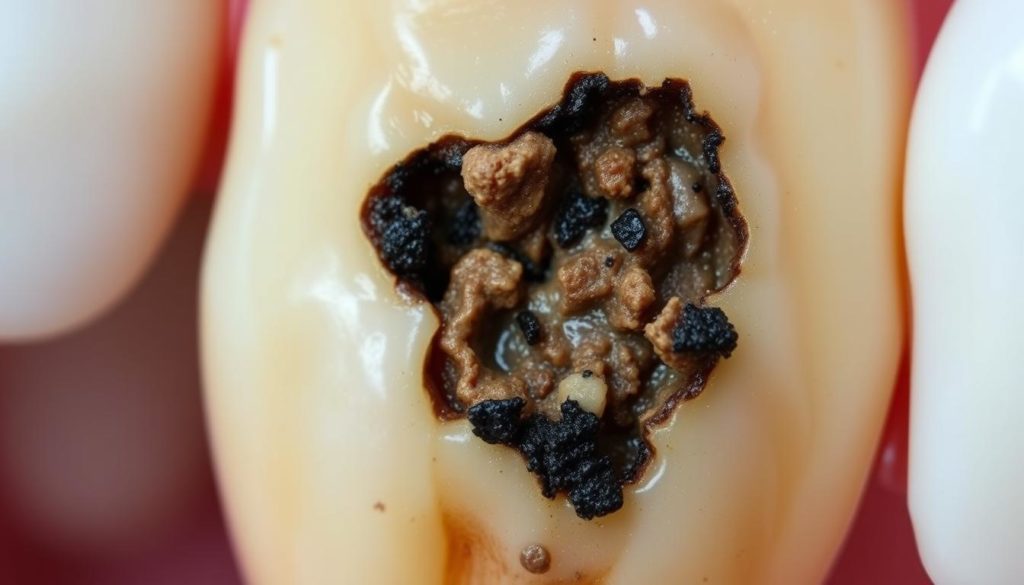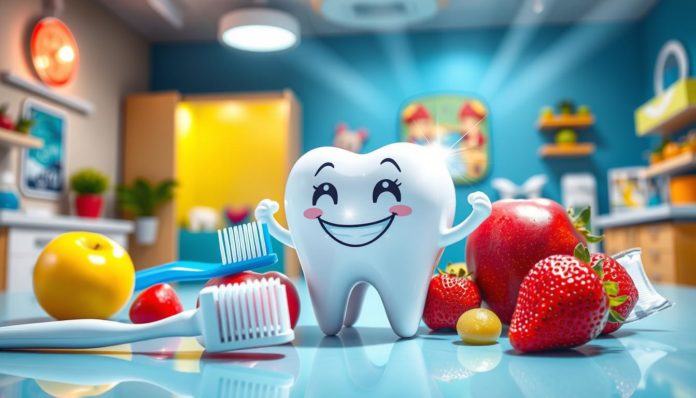Did you know nearly 92% of adults from 20 to 64 have had dental caries? This high number shows how vital it is to stop cavities. Learning the best ways to prevent them is key for good oral health.
Combating tooth decay involves simple daily steps and regular dentist visits. Brushing, flossing, and check-ups are essential. These actions can keep toothaches and tooth loss at bay. They also fight health problems caused by mouth bacteria.
Amy J. Nowinski of the UIC College of Dentistry suggests using Caries Management by Risk Assessment (CAMBRA). This method focuses on personal treatments and spotting problems early to prevent cavities.
Understanding your personal risk for cavities is crucial. Dentists can help tailor your prevention plan. Discussing treatments and eating habits with them can boost your dental care.
Keeping your mouth healthy is your job every day. Use these tips and habits for a healthy, cavity-free smile.
Understanding Cavities: What They Are and How They Form
Cavities are also known as dental caries. They result from permanent damage to your tooth’s surface. This usually happens because of not brushing properly, plaque buildup, and eating too many sugary or acidic foods.
Definition of Cavities
Cavities are decayed areas on your teeth’s hard surface. Another name for this problem is tooth decay. It can appear as holes or damage to your teeth. Not taking good care of your teeth can make cavities worse. This can lead to bigger teeth problems.
The Process of Tooth Decay
The cavity starts when plaque gathers on your teeth. Eating sugars and carbs feeds the bacteria in plaque. These bacteria then make acids.
These acids wear down the tooth enamel slowly. This process leads to tooth decay. If acid attacks keep happening, cavities may form or get worse. They can go deep into your tooth.

- Initial Stage: Plaque buildup creates an acidic environment.
- Second Stage: Acid erosion begins to demineralize the enamel.
- Advanced Stage: Demineralization leads to visible cavities.
Spotting cavities early is key to stopping more damage. Look out for signs like tooth sensitivity, visible holes, or pain. Knowing about cavities and how tooth decay works is important. It helps you take care of your dental health better.
Importance of Regular Dental Check-Ups
Going to the dentist regularly is key for good oral health. At these visits, you get a full dental exam and cleaning. This keeps your mouth healthy and disease-free.

Dental Examinations and Cleanings
Your dentist checks your teeth and gums carefully during these visits. They look for tooth decay, gum disease, or other issues. It’s an important part of keeping your mouth healthy.
Also, you get a professional cleaning that takes away plaque and tartar. This stops cavities and keeps your mouth clean.
Detecting Early Signs of Decay
One great thing about regular check-ups is finding decay early. If your dentist spots problems soon, they can fix them quickly. This stops small issues from getting bigger and saves your teeth.
| Benefit | Description |
|---|---|
| Early Decay Detection | Allows for timely intervention, preventing further damage. |
| Professional Dental Cleanings | Removes plaque and tartar, promoting better oral health. |
| Oral Health Assessment | Evaluates risk of decay and addresses potential issues. |
Optimal Brushing Techniques
Learning the best ways to brush your teeth is key for great dental health. It’s important to pick the right toothbrush, know how to brush well, and use fluoride toothpaste. These steps help fight off plaque and boost your mouth’s health.
Choosing the Right Toothbrush
Choosing the right toothbrush is crucial for your dental routine. Dentists suggest a soft-bristled one to keep gums safe. It’s also important to get a new toothbrush every 3 to 4 months. This keeps your brushing effective and stops germs from building up.
Proper Brushing Method
To get rid of plaque better, use the right brushing technique. Hold your brush at a 45-degree angle to your gums and brush lightly. Using short strokes, this way cleans your teeth well without hurting your mouth.
Using Fluoride Toothpaste
Adding fluoride toothpaste to your routine makes teeth stronger and protects against holes. Fluoride is key for fighting decay. It’s a must-have for keeping your teeth healthy.
The Role of Flossing in Preventing Cavities
Flossing is key to good oral health. It gets to places toothbrushes can’t reach. By removing food bits and plaque, flossing stops cavities from forming. Knowing the types of dental floss and how to floss right is crucial for keeping your mouth clean and healthy.
Different Types of Floss
There are many types of dental floss available for different needs. You can choose from waxed, unwaxed, dental tape, or floss picks. Each kind has its own advantages to help with your dental care.
| Type of Dental Floss | Benefits |
|---|---|
| Waxed Floss | Glides easily between tight teeth and doesn’t shred |
| Unwaxed Floss | Thinner and great for closely spaced teeth |
| Dental Tape | Wider and flatter, ideal for wider spaces |
| Floss Picks | Convenient and easy to use, especially for those with limited dexterity |
Effective Flossing Techniques
To floss well, use about 18 inches of floss. Wind most of it around a finger on each hand. Slide the floss gently between teeth with a back-and-forth motion. Make sure to curve it around each tooth and move it up and down to clear away food and plaque.
Adding good flossing practices to your daily routine helps prevent cavities. It doesn’t matter if you use standard floss, dental tape, or floss picks. The important thing is to do it regularly and correctly. Make flossing a daily habit to keep your smile bright and healthy.
Dietary Choices: Foods to Avoid and Include
Your diet is key to good oral health. Choosing the right foods can prevent many dental problems.
Impact of Sugar and Acidic Foods
The sugar impact on teeth is big. It often leads to cavities. Sugar combines with mouth bacteria to form harmful acids.
Similarly, acidic foods like citrus fruits and sodas weaken enamel. It’s important to be mindful of these effects.
- Limit sugary snacks and drinks.
- Avoid high-acid foods such as tomatoes and coffee.
- Rinse your mouth with water after consuming acidic foods to neutralize the acid.
Cavity-Fighting Foods
Adding certain foods to your cavity-prevention diet boosts oral health. Eating crunchy fruits and vegetables such as apples and carrots cleans teeth surfaces. Dairy products help balance the mouth’s acidity and promote a healthy diet for oral health.
| Food Type | Benefits |
|---|---|
| Dairy Products | Neutralize acids and provide calcium for strong teeth. |
| High-Fiber Fruits and Vegetables | Stimulate saliva production which helps wash food particles and acids away. |
| Whole Grains | Promote overall health, including oral health, by reducing inflammation. |
| Green and Black Teas | Contain compounds that suppress harmful bacteria in the mouth. |
The Benefits of Fluoride and Sealants
Adding fluoride and sealants to your dental care can greatly improve your oral health.
Fluoride Treatments
Fluoride is key in fighting cavities. It strengthens tooth enamel so it can better resist decay. By using fluoride, you get an added defense against cavities. You can get fluoride from special toothpaste or professional treatments at the dentist.
Dental Sealants
Dental sealants act as a barrier against bacteria and plaque. They’re thin coatings put on the back teeth. Easy to apply, they protect your teeth for years. Sealants help protect the deep grooves in your molars from cavities.
The Effect of Drinking Water on Oral Health
Drinking water is vital for keeping your mouth healthy. It washes away food bits and bacteria. This lowers the chance of getting cavities or gum disease. Water also keeps the mouth’s pH level balanced. This prevents bacteria from growing.
Fluoride in water is very important. It makes tooth enamel stronger and helps fight cavities. Communities with fluoridated water see fewer dental caries. This shows how vital fluoridated water is for our daily drinks. For more information, visit the importance of drinking water and oral health.
Water fights dry mouth too. If your mouth is moist, you have enough saliva. Saliva stops acid from hurting your teeth. It also makes brushing and flossing more effective. So, drinking more water boosts your dental care routine.
| Habit | Benefit |
|---|---|
| Drinking Water Regularly | Cleans the mouth and washes away food particles and bacteria. |
| Drinking Fluoridated Water | Strengthens tooth enamel and prevents cavities. |
| Staying Hydrated | Prevents dry mouth, ensuring a balanced pH and healthy saliva production. |
It’s key to keep hydrated. Drinking water has many benefits for your mouth. Even a simple glass of water can keep your smile healthy.
Impact of Smoking and Tobacco Use
Smoking and tobacco use badly affect your mouth’s health. Effects of smoking on teeth include stains, discoloration, and more plaque and tartar. These issues can cause many dental problems.
One big worry about oral health risks of smoking is gum disease. Smokers are more likely to get gum disease. This is because tobacco messes with how gum tissue cells work. It also reduces blood flow to the gums, making it hard to fight infections. This can lead to gums pulling back and, eventually, loss of teeth.
Also, tobacco use and cavities are connected. Smoking makes you more likely to get cavities because it lowers saliva production. Saliva helps clean your mouth and fight off harmful acids. So, smokers tend to have more and worse cavities than non-smokers.
Moreover, smoking is a top reason people get oral cancer. Tobacco’s toxic chemicals make the mouth more likely to turn cells cancerous. Quitting tobacco use is the best way to lower these oral health risks of smoking. Stopping smoking improves your dental and overall health.
Using Mouthwash for Better Oral Hygiene
Mouthwash can really change your oral care game, offering more than just a minty breath. It fights bacteria and helps keep your gums healthy. But choosing the right one and using it correctly is key for the best results.
Choosing the Right Mouthwash
It’s important to pick a mouthwash that meets your needs. Are you fighting dry mouth, sensitivity, or just want to smell fresh? There are many kinds, like fluoride, antiseptic, or natural options. Check out this guide on mouthwash for help. If you’re sensitive to alcohol, avoid mouthwashes with it.
How to Use Mouthwash Effectively
Using mouthwash right is as important as picking the best one. You’ll need to swish it around your mouth for 30 to 60 seconds. Always follow the label’s instructions to get the most benefits. Remember, mouthwash does not replace brushing and flossing. Instead, it’s an extra step for a complete oral care routine. Using it right helps you get the full benefits of mouthwash and keeps your mouth healthy.
FAQ
How can I prevent cavities effectively?
To keep cavities away, brush your teeth two times a day with fluoride toothpaste. Don’t forget to floss every day and use mouthwash. Also, seeing your dentist for regular check-ups and cleanings is key.
What causes cavities?
Cavities happen when plaque builds up, you eat too many sugary and acidic foods, or don’t clean your teeth well. These problems lead to tooth decay.
How often should I have dental check-ups?
Try to see your dentist every six months. These visits can catch tooth decay early. They also include cleanings to get rid of plaque and tartar.
What toothbrush should I use for optimal brushing?
Choose a soft-bristled toothbrush to protect your gums while cleaning plaque. Remember to get a new toothbrush every 3 to 4 months.
What are the best flossing techniques for cavity prevention?
Start with 18 inches of floss, using your middle fingers to manage it. Slide the floss gently between your teeth. Curve it around each tooth and below the gum line, then use a back-and-forth motion to clean each space.
How does my diet affect my risk of cavities?
Eating lots of sugars and acidic foods can lead to cavities. Eating fruits, vegetables, and other foods that fight cavities will help keep your mouth healthy.
What are the benefits of fluoride treatments?
Fluoride treatments make your tooth enamel stronger and more resistant to decay. They add an extra layer of protection against cavities.
How do dental sealants work?
Dental sealants are a protective coating for the back teeth. They keep enamel safe from plaque and acids, helping to prevent cavities.
How does drinking water benefit oral health?
Drinking water, especially if it has fluoride, helps clean away food and bacteria. It keeps your mouth’s pH balanced and strengthens your teeth, which helps prevent cavities.
How does smoking affect dental health?
Smoking raises your risk of gum disease, tooth decay, loss, and oral cancer. Giving up smoking can greatly improve both your oral and overall health.
What type of mouthwash should I use?
Pick a mouthwash that fits your needs, whether it’s for dry mouth or to reduce sensitivity. Antibacterial mouthwashes are good for controlling plaque and preventing cavities.
How do I use mouthwash effectively?
Use the amount directed, swish it in your mouth for 30 seconds to a minute, then spit it out. Avoid rinsing with water afterwards to keep the mouthwash effective.


